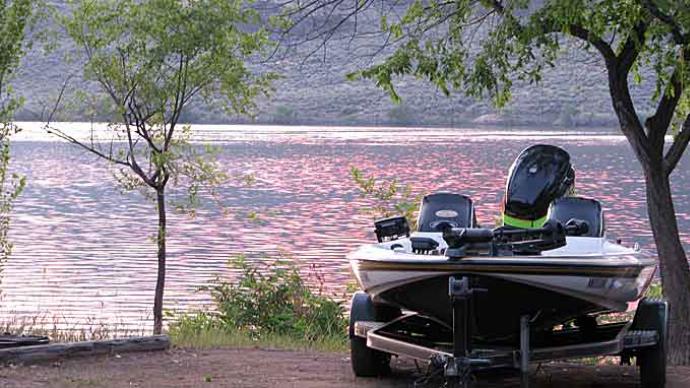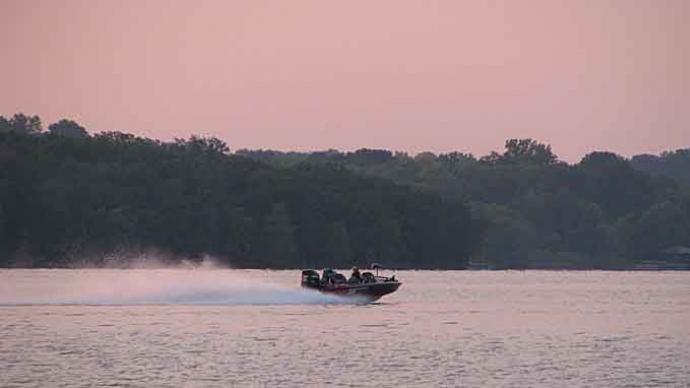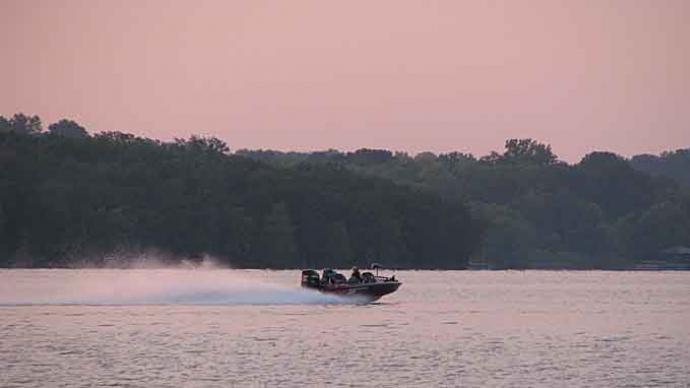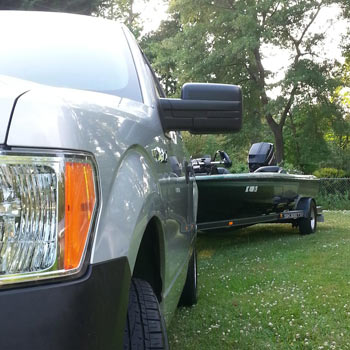
Every angler has a soft spot for the fishing hole that’s close to home. A bit of free time is all you need to get there, make some casts and catch a few bass. Those regular opportunities allow you to build your angling confidence and knowledge. For example, if you know exactly where the bass are, it’s easy to experiment with new-to-you lures and techniques.
But with all the benefits, home waters usually have a downside. At some point, things will start to feel stale. And when that happens, you’ll want to spread your fins and swim toward new waters.
Many things make bass fishing exciting, and exploring new waters is at the top of that list. The anticipation of what you might uncover puts it there. It might be a lake where the bite is fast and furious or a river where lunkers lurk. It could be the site of your next tournament or where you and your family are headed for vacation. For whatever reason, the call of the road is loud for most bass anglers.
Leaving home to fish requires planning and packing, whether for an overnight or a whole week. There are the big things to handle, such as reserving accommodations, planning your driving route, and prepping your vehicle and boat trailer. And there are plenty of others that you should consider packing. Some could mean the difference between heading home early and fishing every minute. Others add convenience, and some can help ensure your safety.
While the packing list varies among anglers and destinations, here are ten things that every angler should include. You may need them, you may not. But you’ll sleep better and enjoy yourself more knowing you have them along for the ride.
-
Grab maps
Technology spin’s the world today, especially when it comes to travel. GPS, whether on your phone or your vehicle’s dash, has ended those awkward roadside conversations when you ask for driving directions. And while it also eliminates wrestling a paper roadmap back into its folds, you should keep one or two of those in your vehicle.
Image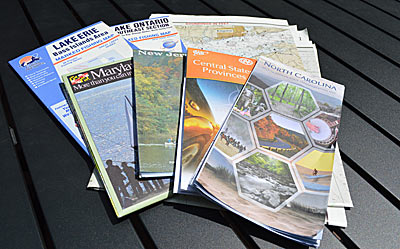
Always pack paper maps. A road map will help you find an alternate route, for example, it’s challenging to beat the big-picture view of lake maps. Photo by Pete M. Anderson While technology seems omnipresent, it isn’t always reliable. After leaving your phone charger at home or spotty service at remote fishing spots, a dead battery may render your device and the driving directions and alerts it offers useless. Even if those are in order, it may not easily direct you to an alternate route around an emergency or traffic or to the small lake where you want to make “just a few casts” on the way home. A paper map, which is often offered for free at tourist centers along interstates or to members of automobile associations, will show you the way.
It’s not much of a different situation when you get on the water. Your electronics’ mapping and navigation will be vital to get you through unfamiliar water and, more importantly, back to the dock. But even larger screen sizes can’t give you the same big-picture view as a paper map. It will help you locate other spots similar to the one where you are catching bass, for example, and many include fishing tips and suggestions.
-
Select spares
Packing your tackle is a no-brainer. But honestly, most of us bring bags, and boxes of spares often go unused. So, concentrate on the lures and soft plastics you fish most instead of bringing everything. For example, if a black-and-blue jig is your favorite, bring those in different weights and plenty of matching trailers.
Bring an extra spinning and casting reel and a few spools of line if you have them. We all occasionally fluff up a considerable backlash that requires scissors to undo. And when you do, you’ll need new line to get that outfit back in action. New line can make fishing more enjoyable, too. If you’re fishing a technique that twists your line, starting each day with a freshly filled spool will alleviate headaches.
-
Shine a light
Whether it clips to your hat, straps around your head, or fits in your hand, a flashlight will make rigging tackle or your boat easier early in the morning or long after dinner. And if you’re fishing a tournament, it’ll show you the way into your partner’s boat without stepping on any rods.
A flashlight is handy away from a boat, too. Everyone has lost a smartphone between a vehicle’s seats. And there may be no darker spot than where it lands. Shine your light there, and you’ll retrieve it in no time.
-
Sleep better
Even with a full day on the water, under the sun, and in the fresh air, it can be tough to fall asleep in an unfamiliar place. Make it feel more like home by bringing a few items, ensuring you’ll be well-rested and ready for bagging a big limit the next day.
Image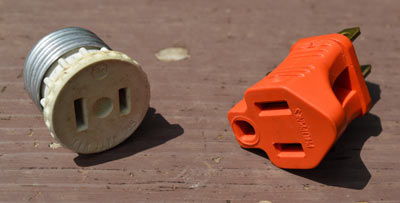
Finding a way to charge your boat’s trolling motor batteries can test your creativity. A few adapters, which allow three-prong plugs to be put into two-prong outlets, or a light socket to plug adapter on hand can save the day. Photo by Pete M. Anderson Bring the pillow and blanket that you sleep with at home. They’ll help you get comfortable and fall asleep quickly. And use your daily alarm clock. You know what to do when it sounds, and more importantly, you know how to correctly set it to ensure it goes off in the morning. Sunrises and tournament blast-offs wait for no angler.
-
Plug in
You’ll have to charge your boat’s batteries daily to keep the trolling motor turning and outboard starting. While you’ll seek out boat-friendly accommodations where electrical outlets are readily available, that’s not what you’ll always find. You’ll need to be ready for alternative power sources, especially if you stay at the smaller, less expensive motels that many traveling bass anglers prefer.
Bring a flat extension cord. If you need to run power from inside, it will fit under a closed-door better. And don’t forget the adapters that allow you to plug a three-prong plug into a two-prong outlet or turn a light fixture into an outlet. Those will help you overcome the fact that many of these motels haven’t been updated in decades. If you turn a light fixture into an outlet, check with the front desk first, and remember to flip on its switch.
-
Dine finely
Professional bass tournament angler Dave Lefebre hails from Erie, Pennsylvania, where fishing includes more than bass. Plenty of walleye, yellow perch, and crappie are up for grabs. Many end up on dinner plates, including those in front of Lefebre. “I eat fish all the time,” he said.
Lefebre’s appetite for fresh fish doesn’t diminish while he’s on the road, fishing Major League Fishing and Bass Pro Tour events across the country. If during practice he catches a few walleyes at Missouri’s Table Rock Lake or Michigan’s Lake St. Clair, for example, or runs into a school of crappie, they go in his livewell for an evening meal. So, he always packs a fillet knife and some newspaper to clean his catch.
It wasn’t always that way. Lefebre used to buy one every trip. “That’s why I have 17 fillet knives at home,” he said. And it hasn’t always been a fillet knife that’s needed. Recently, after a grocery run, he realized he lacked a can opener. He said that had been added to his packing list, too.
-
Build a small toolbox
Keep a small toolbox in your tow vehicle or boat that goes beyond a wrench that’s sized to change a tire or prop. Reduce its bulk by selecting multitask tools, such as adjustable wrenches, pliers, and screwdrivers with interchangeable tips. Be sure to include a utility knife and Allen wrenches, too.
Add some miscellaneous parts, starting with an extra set of grease seals and bearings or a complete hub for your trailer. Don’t forget a few hose clamps in different sizes, duct and electrical tape, zip ties, some stainless-steel screws, washers, and nuts such as the assortments you can buy in a small plastic box. They may help you rig something to keep you fishing, return home or get safely off the water.
Throw in a spare drain plug for your boat. No one knows where they go, but they often go missing just as you’re ready to launch.
-
Pack paper products
Bass anglers don’t only run on boat fuel and full bags of soft-plastic lures. They like to eat, too. MLF and BPT angler Josh Bertrand prepares meals away from his Arizona home by packing several plastic utensils, paper plates, resealable plastic bags, and paper towels. That way, he’s ready to grill on the tailgate or make lunch for the next day.
Now that Bertrand is a father of two, he has added another item to his packing list — baby wipes. He said they make quick work of cleaning up after a meal that was messier than planned or after eating while driving. They clean up almost anything, he said, and stay fresh forever. “Toss them under the back seat, and they are there whenever you need them,” he said.
-
Brace for a broken spring
Most tandem-axle trailers can limp on three wheels at least a short distance. But single-axle trailers are a different story. They need both tires and springs to move. While problems with the former are easy enough to overcome with a spare filled with air — be sure to check it often — the latter poses a bigger problem when broken. But if the wheel, axle, and trailer are still operable, there is a solution.
Pack a block of hardwood that fills the space between the axle and trailer frame usually created by the spring. Lash it in place with a strong rope, and you should be able to ease along to the next service center or safe spot. It will ride rough, so go slow and miss the potholes.
-
Give yourself a lift
Check the lug nuts that hold the spare tire to its carrier on the trailer. Most receive little use, so water and weather can cause them to seize. Loosen and retighten them as part of your regular trailer maintenance. The spare will be useless if you can’t remove it.
Bertrand has one more trick for making tire changes on a vehicle or boat trailer easier. He always brings along a hydraulic floor jack. It’s faster than the jacks that are standard issue with most tow vehicles. It also is more stable on uneven surfaces, like those found alongside a road or in a launch or motel parking lot. “It’s heavy, and it’s bulky,” he said. “But it’s nice when you need it.”


